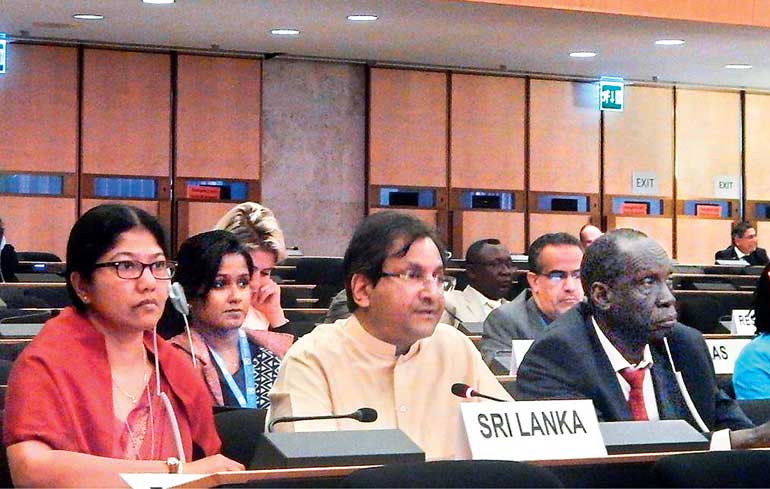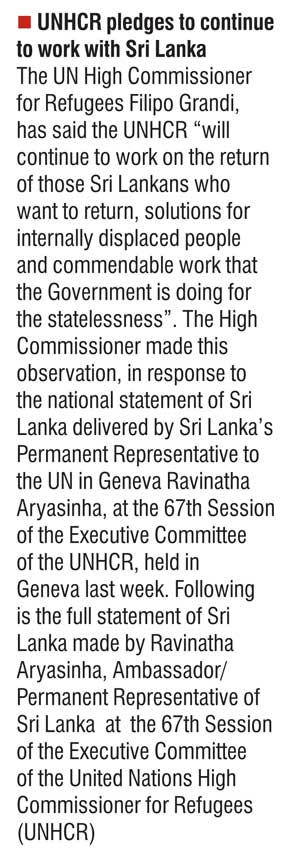Tuesday Feb 24, 2026
Tuesday Feb 24, 2026
Monday, 10 October 2016 00:01 - - {{hitsCtrl.values.hits}}
 I wish to thank High Commissioner Grandi for his first update and analysis to the Executive Committee, elaborating on the global
I wish to thank High Commissioner Grandi for his first update and analysis to the Executive Committee, elaborating on the global  situation of forced displacement over the last year, and in particular for sharing the key priorities he envisages in advancing the UNHCR’s protection mandate. The Government of Sri Lanka wishes him success in this important and crucial task, and extends its fullest support and cooperation.
situation of forced displacement over the last year, and in particular for sharing the key priorities he envisages in advancing the UNHCR’s protection mandate. The Government of Sri Lanka wishes him success in this important and crucial task, and extends its fullest support and cooperation.
The unprecedented scale of large movements of refugees and migrants in recent times has often resulted in tragic stories of despair of the people forced to be on the move for safety and protection. The numbers which include migrants, refugees, asylum seekers and internally displaced have now surpassed 65 million. Forced displacement of such magnitude is a matter of deep concern.Sri Lanka recognises the important role performed by the UNHCR in striving to provide protection, assistance and durable solutions to these vulnerable populations.
Addressing root causes
Sri Lanka is of the view that while meeting the immediate humanitarian needs of those who have been forced to migrate, it is essential to address the root causes as well.
It is also our collective responsibility to prevent human trafficking and related illegal activities that arise as a result of forced migration. A single country or region is not in a position to overcome such crises successfully without the mutual assistance and cooperation of others. Solutions to address root causes need the continuous support and collaboration of the international community. The common political will of the international community is a must in achieving durable solutions. In this context, the historic Summit of the UN General Assembly on ‘addressing large scale movements of refugees and migrants’ marked an important milestone to further the engagement by Member States including by developing a “Global Compact for Safe, Regular and Orderly Migration” and a “Global Compact on Refugees” by year 2018. Sri Lanka fully supports these multilateral efforts to reach productive conclusions within the relevant international legal frameworks and encourages the UNHCR to look for the practical experiences of countries of origin, transit and destination and the inherent challenges, when developing the proposed “Comprehensive Refugee response Framework” as stipulated in the New York Declaration.
As you are aware, during the last 30 years or so, due to the internal armed conflict in Sri Lanka, and other social, economic and political reasons, many of our people left the country. The Government, under the leadership of President Maithripala Sirisena and Prime Minister Ranil Wickremesinghe has taken steps, since January 2015, to create safe, secure and conducive conditions for their return.
Firm commitment
As of September, 582 Sri Lankan refugees (231 families) have returned to the country during this year, 2016, under UNHCR’s facilitated Voluntary Repatriation Program. The Government of Sri Lanka works closely with the UNHCR in this process, and is pleased that there is an increased interest in Sri Lankan refugees to return to the country, and the rate of return is higher than that of 2015.
Sri Lanka recognises refugee returnees as vulnerable individuals who require government assistance for re-integration, and as such the Government provides assistance to returning refugees, especially in the sectors of livelihoods and housing in addition to the re-integration grant and non-food relief assistance provided by the UNHCR. A National Steering Committee on Refugee Returnees has also been established enabling those involved in the refugee returnee process to discuss challenges, find solutions and have regular follow- up.
Due to the conflict that prevailed, Sri Lanka is still grappling with issues related to the Internally Displaced. However, the Government is firm in its commitment to take all efforts to ensure the resettlement of the families who are still in welfare camps. It is an important component of the reconciliation and peacebuilding efforts of the Government.
National policy
On 16 August 2016, the Cabinet of Ministers’ approved the “National Policy on Durable Solutions for Conflict-Affected Displacement” drafted through a wide consultative process with UNHCR assistance as well. The national policy, while identifying the major obstacles to durable solutions, also provides for institutional mechanisms including at national, provincial and local government levels to coordinate and respond to them, as well as a mechanism for monitoring implementation. In addition to the needs of the Internally Displaced Persons, the policy also looks into the re-integration of returning Sri Lankan refugees. We appreciate the assistance provided by the UN, in particular the UNHCR, for drafting this Policy.
The Government is assisted in the resettlement process by the UN and other development partners, yet, we require further assistance for the displaced in our country and we hope that the international community will be forthcoming in this regard. The UNHCR, in particular has been providing assistance in the sectors of: livelihoods; land, housing and property; shelter and protection monitoring. Since Sri Lanka began accessing the UN Peacebuilding Fund (IRF), the UNHCR together with UNICEF assisted more than 2000 families by providing transitional shelter, water and sanitation assistance, protection monitoring as well as mine risk education.
As per the statistics available, Sri Lanka is also a country of destination for people who have been displaced in neighboring countries. Though the Government of Sri Lanka is not a party to the UN Convention on Refugees, Sri Lanka remains committed to work in coordination and cooperation with the UNHCR to address issues pertaining to asylum seekers in accordance with international norms.
You have also identified, preventing, addressing and eliminating statelessness as an emerging priority.
Statelessness
The issue of Statelessness has been comprehensively addressed by Sri Lanka through progressive legal and policy initiatives of successive governments. Several amendments introduced to the Citizenship Act of Sri Lanka has addressed the statelessness among the community of Tamils of Indian Origin and as a result, the UNHCR has identified Sri Lanka as a case of good practice, stating that ‘Sri Lanka presents one of the best examples of how legal and policy reform, combined with a citizenship campaign, can resolve a long-standing situation of statelessness in a short time’.
We recognise the complex challenges in addressing these often interwoven issues, and the need for holistic, innovative, bold and integrated approaches. The pressing demand for resources to meet the short and long term needs have put pressure on the socio-economic fabric of the host countries, already reeling under their own challenges. The need for better preparedness for emergencies and resource mobilisation has become paramount. National as well as collective responses through international partnerships should be garnered to help countries to graduate from humanitarian aid to development, to ensure sustainable solutions and to prevent forced migration.
Sri Lanka takes this opportunity to express its deep appreciation for the work of the UNHCR in Sri Lanka. We acknowledge that there are many challenges in this line of work and express the will to continue to work in cooperation with the UNHCR to find durable solutions.